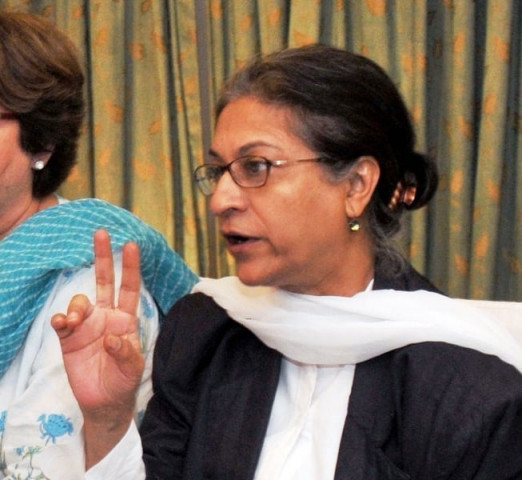Pertinent observations: ‘Cases of alleged blasphemy often lack tangible evidence’
Asma Jehangir addresses seminar on Constitution’s Islamisation and basic rights.

Former Supreme Court Bar Association president Asma Jehangir on Wednesday stressed the need for inclusivity, compassion and mercy to foster a healthy society.
Jehangir was speaking at a seminar at Forman Christian College regarding the 1973 Constitution and the rights of minorities. She spoke about the original conception of the Constitution and how it was amended under former president Ziaul Haq. Jehangir said it had always been understood since its inception that the Pakistani state would have a religious character. She said this had mandated a public role for religion in jurisprudence and politics. Jehangir said this conception was significantly altered following the advent of Zia.

She said The Federal Shariat Court was created to ensure the compatibility of legislation with Islamic provisions. Jehangir said its ambit was expanded later to include advisory powers regarding legislation. She said elections under Zia were held on the basis of separate electorates. Jehangir said the minorities had failed early on to appreciate the exclusive nature of the provision and this had left them disadvantaged.
She said amendments were made to two clauses in the Law of Evidence regarding rape and blasphemy that also had far-reaching consequences.
Jehangir said Zia had effectively criminalised consensual sex and rape victims’ complaints by amending laws regarding rape prosecution. She said it was common knowledge in legal circles that establishing rape in a court was exceeding difficult. Jehangir this could potentially result in the conviction of victims for consensual sex. She recounted the harrowing case of a 13-year-old girl from Swat who became a victim of the legal conundrum. The girl had been raped by a cousin and an uncle. Jehangir said the police had registered a complaint against the culprits on the complaint of a maternal uncle of the girl. She said the girl was imprisoned in Peshawar Jail and sentenced to 100 lashes after she was unable to substantiate her allegation.

Jehangir said the victim had already been imprisoned by the time the case was reported in media. She said the Federal Shariat Court had amended the girl’s sentence but did not acquit her. Jehangir said she had visited the girl’s family after she had finished serving her sentence and had found her to be exceedingly reticent. She said the incident had scarred her for life. Jehangir said she and some colleagues had resolved to fight the law to ensure that a similar fate did not befall their daughters. She said she was glad that the law had been reformed.
She said the blasphemy law was another example of legislation that had been routinely misused on account of being obscurely worded. Jehangir said such cases were called without corpus in legal circles as they were often bereft of evidence. She said the grievances in alleged instances of blasphemy were often intangible.
Jehangir said it was harder to defend suspects after a case had been registered against them as they were often harassed and lacked legal recourse. She said those who decided to defend them did at great risk. Jehangir said lawyer Rashid Rehman was killed earlier this year in Multan for defending a blasphemy suspect.
She said religious leaders had also used the law to harass their rivals. Jehangir said there had been no convictions in such cases as it was only the dispossessed that had to shoulder the burden of its provisions.
She said the law could not be used to foster communal harmony as it was imperative to correct societal attitudes before reforming legislation to safeguard minorities’ rights.
Published in The Express Tribune, November 13th, 2014.


















COMMENTS
Comments are moderated and generally will be posted if they are on-topic and not abusive.
For more information, please see our Comments FAQ